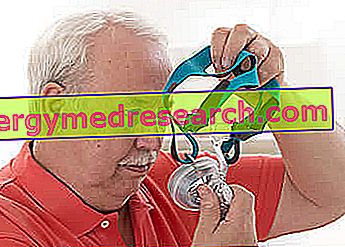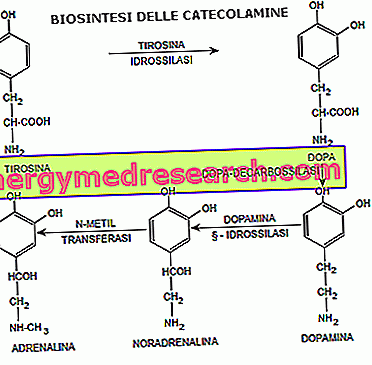Sleep apnea is the most characteristic symptom of Obstructive Sleep Apnea Syndrome (OSAS), which affects up to 5% of the adult population.
Sleep apnea can cause hypoxemia (little oxygen in the blood), inspiratory effort and repeated micro-awakenings.
Gravity is proportional to the frequency and duration of the apneas themselves.
The harmfulness of sleep apnea is due to its complications:
- Cardiovascular disorders.
- Hypertension.
- Stroke.
- Atrial fibrillation.
- Heart failure.

The reduction of pharyngeal musculature and excess soft tissue (especially adipose) are implicated.
In the context of Obstructive Sleep Apnea Syndrome, snoring and drowsiness or excessive daytime weakness are also highlighted.
What to do
The first thing to do, in the doubt of suffering from sleep apnea, is to take a diagnostic path.
- Contact the general practitioner.
- In the meantime, try to identify any signs and symptoms associated with sleep apnea:
- Snoring.
- Daytime weakness.
- Sudden strokes of sleep.
- Dry mouth on waking.
- Mood alteration.
- Poor concentration.
- Dismnesie.
- Urinary incontinence.
- In children, growth retardation.
- Body mass index> 29.
- Neck circumference> 43 or 41cm (male and female).
- Deviation of the nasal septum, turbinate, tonsillar hypertrophy, etc.
- Perform a polysomnography (usually requested directly by the general practitioner or by the center specialized in OSAS). This exam is able to:
- Detecting apneee and ipopnee.
- Classify the disorder.
- Recognize the stage of sleep in which they occur.
- At the discretion of the specialist, perform an electroencephalogram, detection of eye movements and limbs.
- In case of overweight, immediately reduce body weight by 10%.
- Sleep in the side position.
- Dine long before sleep.
- Drink alcohol far from sleep and in any case in moderation.
- At the discretion of the specialist, take specific medications.
- Use specific machinery.
- If necessary, take advantage of surgery.
What NOT to do
- Ignore or underestimate sleep apnea.
- Increase weight or stay overweight.
- Sleep in the supine position.
- Dine and drink alcohol close to sleep.
- Eat a lot before going to sleep.
- Drink alcohol before sleep.
- Take sedatives.
- Smoking a lot.
- Avoid using the CPAP (night-time ventilation device) prescribed by your doctor.
- Avoid surgery recommended by your doctor.
What to eat
Remembering to chew thoroughly, we emphasize the importance of:
- Consume small portions and, overall, a fairly light dinner.
- Prefer easily digestible foods:
- Little fat, therefore only slightly seasoned; in the case of cheeses, choose lean ricottas and light cottage cheese.
- If proteins, medium cooked (not to the blood or even overcooked).
- If prevalently carbohydrates, with the right amount of fiber (portions less than 300g of vegetables, cereals and legumes possibly shelled).
- Cooked with systems that facilitate digestion:
- Affogatura.
- Steam powered.
- By pressure.
- Vacuum packed.
- Vasocottura.
- Baked in foil.
- In a pan over low heat.
- Little spicy.
- Little salted.
What NOT to Eat
Before sleep it is necessary to avoid:
- Alcoholic drinks.
- Large meals.
- Large portions of milk.
- Foods high in fat, especially fast food, fried or fried and junk food in general.
- Foods too rich in indigestible fibers: for example large portions of stewed or raw legumes.
- Foods that delay the emptying of the stomach, increasing the possibility of acid juice (gastroesophageal reflux and regurgitation) rising.
- Carbonated soft drinks that increase the amount of air present in the gastric sac.
Natural Cures and Remedies
In addition to lifestyle adjustments (diet, sleeping position, etc.), natural remedies for sleep apnea are few and not too effective. Some are:
- Nasal patch: it should increase the flow of air through the nostrils.
- Tisane or valerian extract: improves the quality of sleep but does not affect the mechanism of sleep apnea.
- Essential oils: they favor the dissolution of the mucus and tend to ignite the mucous membranes of the upper airways. They can moderate snoring but it is not said that they act positively on the OSAS.
Pharmacological care
Stimulants that act on the symptom of daytime lethargy favoring night rest; do not intervene in the cause:
- Modafinil (eg Provigil).
- Theophylline (eg Aminomal Elisir, Diffumal, Respicur).
- Caffeine citrate (eg Nymusa).
- Amphetamine and Destrohamphetamine (eg DextroStat, Adderall, Dexedrine).
Prevention
Prevention of sleep apnea, OSAS and complications involves:
- Avoid overweight.
- Eventually, lose weight with a balanced low-calorie diet and physical motor activity.
- Eat little in the evening hours and avoid counterproductive practices (alcohol, cigarettes, etc.).
- Perform the most appropriate diagnostic tests.
- Take advantage of drug therapies and other medical treatments.
- If necessary, surgically remove the upper airway flow impediments.
Medical Treatments
The recommended medical treatments for sleep apnea are:
- Continuous Positive Airway Pressure (CPAP): it is a specific machine that produces forced air. It should be worn as a mask and connected to a small compressor. Facilitates nighttime breathing even when airway constriction occurs.
- Surgery of anatomical defects related to the upper airways: they are of otorhinolaryngology or maxillofacial competence. The most common are:
- Septoplasty.
- Reduction of turbinates.
- Tonsillectomy.
- Adenoidectomy.



